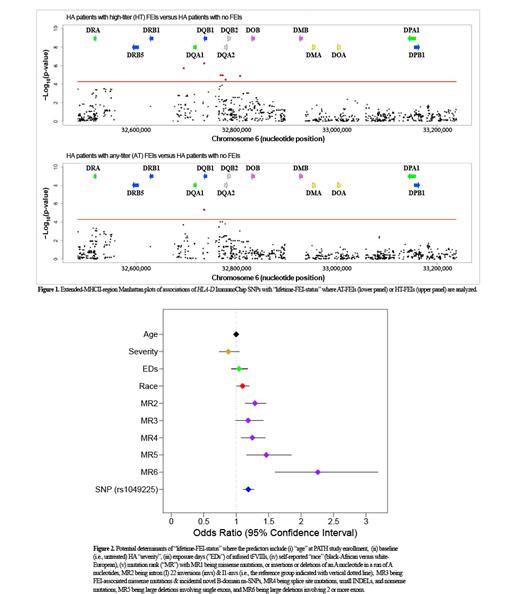Hemophilia-A (HA) is caused by heterogeneous factor (F) VIII gene ( F8) mutations, variably deficient plasma FVIII activity and reduced to absent intrinsic-pathway amplification of coagulation. Infused therapeutic-FVIII-proteins (tFVIIIs) prevent bleeding in all HA patients but ~30% with severe HA and ~7.5% with non-severe HA become refractory with the development of neutralizing anti-tFVIII-antibodies called “FVIII inhibitors (FEIs)”. HLA-class-II (HLAII) molecules are critical for the development of FEIs and several association studies on different HA patient populations clearly implicate an important role for the highly polymorphic encoding HLA-D loci in the variable frequency of immunogenicity observed for tFVIIIs infused in different subjects with HA. However, the results from these studies were often conflicting, and none have undergone true independent confirmation. We use the ImmunoChip to genotype each subject in the PATH study simultaneously for the >900 single-nucleotide-variations (SNVs) distributed across the extended MHC-class-II (MHCII) region-which includes the classical- and non-classical-HLAII-genes and -pseudogenes-and then evaluated each independently for associations with FEI risk while accounting for the non-independence of data due to genetic relatedness and F8 mutational heterogeneity using novel statistical methods. The “lifetime-FEI-status” of the 438 North American HA patients in PATH-whose racial-identity/ethnic-ancestry was self-reported as either black-African (n=200) or white-European (n=238)-was the dependent variable of interest. The F8-mutation data and a genetic-relatedness matrix were incorporated into a binary linear mixed model of genetic association with lifetime-FEI-status (Yes vs. No), with ‘Yes’ designating those patients having FEIs of either any titer (AT), i.e., >0.4 Bethesda Units (BUs) mL -1, or only high-titer (HT), i.e., ≥5.0 BUs mL -1. Following the analytical procedure used in prior studies designed to identify determinants of FEI risk, we conducted the extended-MHCII-region-wide association screen-against the 926 distinct SNVs with high-quality genotypes that passed QC-of lifetime-FEI-status on two groups of FEI-positive patients, i.e., those with AT-FEIs, or those with only HT-FEIs. HA patients in the HT-FEI group are suspected to be more homogeneous with respect to the underlying immunobiology as they appear clinically to have induced full adaptive immunity. In contrast, HA patients in the AT-FEI group are heterogenous as some will have transient FEIs, which spontaneously disappear, and others will have FEIs that may remain low-titer (LT) despite continued infusions of tFVIIIs. We found several SNPs that were not only significantly associated in both FEI groups-or significant and suggestive respectively in the HT- and AT-groups-but also increased in significance (i.e., their p-values decreased) under the HT analysis ( Figure 1). The latter observation indicates that these results correspond to true associations that became more apparent as sources of “noise” were removed upon going from the AT to HT analysis. These included a SNP in the 3'-UTR of DQB1 (rs1049225, p-value=5.7E-7) and two intergenic HLAII region SNPs (rs2647012, p-value=1.1E-5; and rs2858324, p-value=1.1E-5). The DQB1 SNP reached an ImmunoChip-wide significance threshold in the HT analysis (i.e., a p-value <5.9E-7) and extended-MHCII-region-wide significance in the AT analysis (i.e., p-value <5.4E-5). Although the two HLAII-intergenic SNPs were not ImmunoChip-wide significant, they were significant across the MHCII region (i.e., p-value <5.4E-5). We found two SNPs that were significant and suggestive, respectively, in the HT- and AT-FEI analyses (rs9276189, p-value=1.3E-5; and rs2856717, p-value=3.3E-5), as well as one SNP that was significant in the HT-FEI analyses but not significant or suggestive in the AT analysis (rs9271366, p-value=1.9E-6). Our results establish that a novel DQB1 genetic variant is associated with FEI risk and confirm that HLA-DQ-allotypes and race independently influence the rate of FEI development in HA ( Figure 2).
Disclosures
Chitlur:HRSA/MCHB: Research Funding; Takeda: Honoraria; BPL Inc: Honoraria; Novo Nordisk: Consultancy, Honoraria; Children's Foundation: Research Funding; Genentech Inc: Honoraria, Research Funding; Genzyme Corp: Honoraria; Novartis Pharmaceuticals: Research Funding; Agios Pharmaceuticals: Honoraria, Research Funding. Escobar:Sanofi: Consultancy, Research Funding; Novo Nordisk: Consultancy, Research Funding; Genentech: Consultancy, Research Funding; BioMarin: Consultancy; Takeda: Consultancy, Research Funding; Pfizer: Consultancy; Kedrion: Consultancy; NHF: Consultancy; CSL Behring: Consultancy; uniQure: Consultancy, Research Funding; Bayer: Consultancy, Research Funding; HEMA Biologics: Consultancy, Research Funding; LFB: Consultancy, Research Funding.


This feature is available to Subscribers Only
Sign In or Create an Account Close Modal